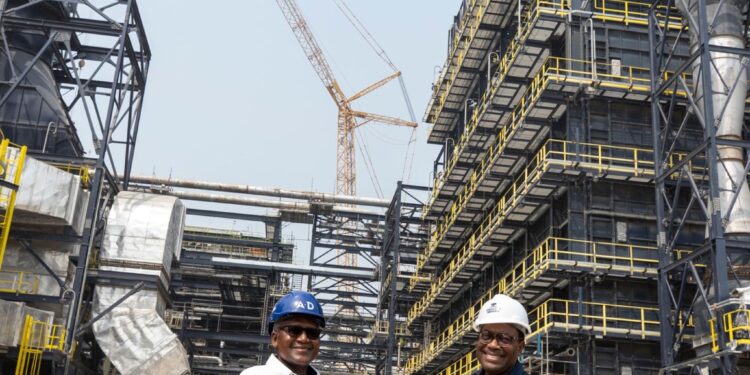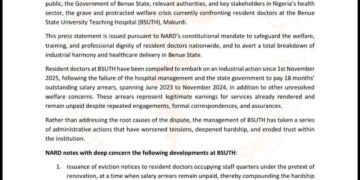The Dangote Petroleum Refinery is set to import additional crude oil as the supply from the Nigerian National Petroleum Company Limited (NNPC) falls short of meeting the fuel production needs at its $20 billion Lekki-based facility.
Officials at the refinery revealed that production has increased to approximately 500,000 barrels per day, with a target to reach 650,000 barrels per day by June. While confirming that the naira-for-crude deal, as directed by President Bola Tinubu last year, remains in place, the sources—who spoke on condition of anonymity due to a lack of authorization to speak to the press—stated that the facility will need to import more crude to meet its target.
The NNPC is reportedly struggling to supply the required 350,000 barrels per day for the 650,000-barrel capacity refinery, given that the state-owned company is tasked with providing 450,000 barrels per day for Nigeria’s domestic consumption. With its current production capacity of 500,000 barrels per day, refinery officials noted that additional crude will need to be sourced from outside Nigeria.
They clarified that the issue is not that the NNPC cannot supply crude, but rather that the refinery’s daily feedstock requirements cannot be met solely by the state-owned oil company.
Asked if the refinery plans to import more crude now that the NNPC refineries are coming back on stream, one of the impeccable sources at the plant replied, “Of course!
“This is a 650,000 barrels per day capacity refinery. And as you know, we are also ramping up. You see, maybe by the middle of the year, we will hit 650,000. Do you know what 650,000bpd means?“
Another source corroborated this, saying, “It is not that anybody is saying NNPC cannot do it. No! But you look at what we have. We are not a 200,000bpd refinery. We are talking about 650,000 barrels.
“Currently, we are at 500,000bpd; we will ramp to 650,000 by midyear. You know what it means? So, it is a normal process to source crude oil anywhere it is available.”
In another chat with our correspondent, a consultant to the refinery boasted that the refinery game is for the ’big boys’, saying the refinery is one of the largest in the world.
“It is not that anybody is saying NNPC cannot do it. The game is up, and the game is for the ’big boys’.
“How many 650,000-capacity refineries do you have in this world? Even in the entire Europe? Have you seen the OPEC report? They said the refinery is affecting their PMS market in Europe. Of course, the eagle has landed,” he stated.
On the burn rate of Dangote petrol, the consultant explained, “The whole thing is simple. You know we are producing the Euro 5 standard. So, the quality is bound to be high. That’s what Nigerians are experiencing in the burn rate of our petrol.”
As Nigeria’s refining capacity grows, the 450,000 barrels of crude oil allocated for local refineries is no longer sufficient. The Nigerian Upstream Petroleum Regulatory Commission (NUPRC) has revealed that the Dangote Refinery, the Port Harcourt Refinery, and six other facilities will require 770,500 barrels per day for fuel production.
According to data from the NUPRC, sourced from the Nigerian Midstream and Downstream Petroleum Regulatory Authority, the country’s total refining capacity stands at 974,500 barrels per day, based on the operational refineries.
It’s worth noting that in July, President Bola Tinubu instructed the NNPC to sell crude oil to local refineries in naira.
“The Federal Executive Council has approved that the 450,000 barrels meant for domestic consumption be offered in Naira to Nigerian refineries, using the Dangote refinery as a pilot. The exchange rate will be fixed for the duration of this transaction,” Tinubu’s spokesman, Bayo Onanuga announced last year.
In October, the committee overseeing the naira-for-crude deal began selling crude oil to the Dangote Refinery in naira, limiting the sales to petrol-producing refineries. However, with the Port Harcourt and Warri refineries now operational, additional refineries will be included in the naira-for-crude arrangement.
The Nigerian Upstream Petroleum Regulatory Commission (NUPRC) stated that eight refineries will require a total of 123.5 million barrels of crude oil in the first half of 2025. These refineries include Dangote, Port Harcourt, Warri, Kaduna, Opac, Waltersmith, Duport Midstream Company Limited, Aradel, and Edo refineries.
According to the crude oil production forecast from oil-producing companies and the refining needs of functional refineries in Nigeria, as signed by NUPRC Chief Executive Gbenga Komolafe, the Dangote Refinery alone is projected to require 550,000 barrels of Nigerian crude oil daily—17.05 million barrels per month—and 99.55 million barrels between January and June 2025.
The other refineries’ daily crude oil requirements include: Opac Refinery (5,000 bpd), Waltersmith (4,500 bpd), Duport (2,000 bpd), Edo Refinery (1,000 bpd), Aradel Refinery (7,000 bpd), Port Harcourt Refinery (60,000 bpd), Warri Refinery (75,000 bpd), and Kaduna Refinery (66,000 bpd).
The Federal Government plans to review the program in April to assess its success. Meanwhile, the Dangote Refinery is already constructing eight additional tanks to store imported crude oil, as local supply from the Nigerian National Petroleum Company Limited (NNPC) has become unreliable.
The $20 billion refinery is increasing its crude storage capacity by 41.67 percent to 3.4 billion litres, with officials stating that the low supply of crude from the NNPC is driving the refinery’s growing dependence on imports.
“Importing crude from other countries instead of buying locally means that our crude stockpiles will have to be higher,” the Vice President in charge of oil and gas business at Dangote Industries, Devakumar Edwin, was quoted as having said.

Address: No 5 Ejembi Eko Street, New GRA, Makurdi, Benue State, Nigeria






